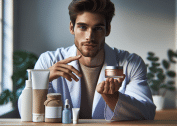Discover how gentle routines and mindful product choices can help you achieve glowing, healthy skin. This guide explores natural skincare habits, ingredient awareness, and stress-reducing wellness practices that contribute to a radiant complexion safely, sustainably, and affordably.
The Power of Daily Skincare Routines
Every radiant complexion has a foundation—consistent skincare habits. Starting and ending the day with mindful care impacts your skin far more than sporadic treatments. Cleansing is often the first step toward maintaining clear, glowing skin. Gentle cleansers remove buildup without stripping the skin, preparing it to absorb moisture and nutrients. When combined with regular moisturizing, these routines encourage skin to renew naturally and retain its essential glow. Consistency is key, whether the focus is supporting sensitive skin or battling oily patches. Even people new to skincare can benefit by starting simple: a mild cleanser, lightweight moisturizer, and adequate sun protection.
Adapting routines to your individual skin type can make a noticeable difference. Dry skin, for example, may need richer creams and less frequent washing, while those with oily skin could benefit from lightweight, non-comedogenic formulas. As you fine-tune your daily habits, gentle exfoliation once or twice a week may help. This removes dead skin cells that can dull the complexion, though over-exfoliation should be avoided to protect the skin barrier. It’s important to observe how your skin responds, adjusting the routine over time—often less is more. Building these habits not only enhances appearance but supports long-term skin resilience.
Environmental factors also come into play. Humidity, pollution, and even indoor heating affect skin health daily, making it necessary to modify your routine seasonally or during lifestyle changes. For those seeking glowing skin, hydration inside and out plays an underappreciated role. Sipping water throughout the day and using hydrating serums can help retain plumpness and elasticity. Over time, even modest habits lead to a noticeable difference, reinforcing that consistency and self-awareness are the real secrets behind a luminous complexion.
Understanding Ingredients: What to Look For
Ingredient transparency has transformed the beauty industry. Today, more people look beyond branding to understand what’s inside each product. Recognizing ingredients like hyaluronic acid, which draws moisture to the skin, can help boost hydration levels and smoothness. Vitamin C, another favorite, is associated with brightening effects and antioxidant support. Meanwhile, niacinamide often appears in products targeting uneven tone and texture, as its soothing properties complement many skin types. Choosing products containing science-backed, gentle ingredients supports both efficacy and skin safety—essential for anyone pursuing a healthy glow.
With so many choices, it’s easy to feel overwhelmed. Fragrance-free, dermatologist-tested, or hypoallergenic formulas reduce the risk of irritation, especially for sensitive or allergy-prone skin. Ingredient lists also reveal potential irritants such as alcohols or sulfates, which can disrupt the skin barrier with repeated use. Keeping things simple is often most effective; minimal ingredient lists can reduce the chances of negative reactions. If unsure, patch-testing before introducing a new product is highly recommended, allowing you to spot any sensitivity without widespread effects on your skin.
Natural and plant-based ingredients remain popular, but not every botanical is suited to every skin type. Aloe vera, oats, and chamomile are broadly used for their calming effects, while oils like jojoba and squalane can add moisture without feeling heavy. It’s wise to select products tailored to your individual needs, supported by trustworthy information sources and possibly dermatological guidance. Instead of chasing trends, focusing on how the skin responds leads to more satisfying and safer skincare results over time.
Wellness Habits That Influence Skin Health
Skin reflects overall well-being. Lifestyle choices such as sleep quality, nutrition, and stress management often show on your face. When stress spikes, hormones like cortisol increase oil production, which may trigger breakouts or irritation. Managing stress through mindfulness practice, regular exercise, or simple breathing techniques has demonstrated benefits for both mental health and skin clarity. Building these habits is as vital as choosing the right cream or serum.
Sleep is another key factor. Overnight, skin enters a natural repair mode, rebuilding collagen and restoring hydration levels. Interrupted or insufficient sleep can lead to dullness, dryness, or pronounced fine lines. Creating an evening wind-down ritual—limiting screens, using calming essential oils, and ensuring a cool, dark environment—may foster better rest and, in turn, a healthier complexion. These silent nighttime routines work hand in hand with daytime skincare efforts.
Nutrition is equally important. Antioxidants, vitamins, and hydration all play roles in supporting the skin’s strength and resilience. A diet emphasizing fruits, vegetables, lean proteins, and good fats often complements topical skincare by delivering nutrients from the inside out. Drinking adequate water helps maintain the skin’s natural moisture barrier, and limiting processed sugars may decrease the likelihood of inflammation or blemishes. Each choice, though small, has the potential to enhance your natural glow.
Sun Protection and Its Daily Role
Daily sun protection stands as one of the most critical habits for maintaining glowing, youthful skin. Ultraviolet radiation from the sun can accelerate the appearance of fine lines, pigmentation, and spots, even on cloudy days. Broad-spectrum sunscreen applied each morning forms a protective barrier, helping to minimize long-term damage and keep skin tone even. Lightweight, non-greasy formulas suit all skin types and encourage daily application year-round, whether spending time outdoors or near windows.
Sunscreen is only one piece of the puzzle. Protective clothing, wide-brimmed hats, and sunglasses extend this shield when UV exposure peaks. For those concerned about sensitivity, mineral-based sunscreens containing zinc oxide or titanium dioxide offer effective coverage with less risk of irritation. Educating yourself about UV index levels in your area and reapplying sunscreen every two hours during prolonged exposure ensures consistent protection. Over time, these habits help prevent premature aging and support a radiant complexion.
Incorporating sun safety often inspires a sense of mindfulness in other areas of skincare. By building protection into your everyday routine—just like brushing your teeth or washing your face—you help your skin maintain its clarity and strength. Experts emphasize that sun protection is a lifelong commitment. From childhood through adulthood, these habits safeguard the health and appearance of your skin far into the future.
Addressing Skin Concerns Mindfully
Common skin concerns such as acne, sensitivity, and hyperpigmentation require a patient, balanced approach. Reacting quickly to a breakout or a rash can sometimes cause more harm. Instead, supporting the skin’s natural healing process with gentle cleansing and minimal intervention often leads to better outcomes. Consulting a healthcare professional for persistent issues helps target solutions while avoiding unnecessary overuse of products.
It’s important to distinguish between temporary irritation and underlying conditions. Records such as a daily skincare journal can help identify triggers—be it diet changes, environmental exposures, or new cosmetics. Adjusting routines based on clear observations rather than impulses brings more sustainable improvements. Topical treatments for specific concerns should be introduced one at a time and monitored carefully for effectiveness and tolerance.
Various professional resources exist, from dermatologists to certified estheticians, for those seeking extra guidance. They can help tailor recommendations and suggest suitable options, considering sensitivities or allergies. Trusted online organizations and health portals offer science-based information for at-home care. Ultimately, a mindful, informed approach yields clearer, brighter skin and fosters confidence in making decisions for your skin’s long-term benefit.
The Connection Between Mental Wellness and Skin
Mental wellness and skin health are inextricably linked. Emotional stress often appears physically as dullness, breakouts, or increased sensitivity. Mindfulness, meditation, and self-care routines can regulate hormone fluctuations, support sleep, and protect the skin from stress-induced flare-ups. By integrating mental wellness practices into daily life, you promote a balanced internal environment that benefits your complexion externally.
Research indicates that people who practice gratitude or mindfulness consistently often experience healthier, calmer skin. Small rituals, such as mindful breathing while applying moisturizer, transform basic skincare into moments of relaxation and self-connection. Over time, these practices build resilience both emotionally and at the skin’s surface. Even short, daily mental health check-ins make a tangible difference.
Wellness is holistic. Prioritizing both emotional and physical care brings a sense of harmony that shines through in your appearance. Learning to identify high-stress triggers, talking to supportive friends or professionals, and building gentle habits all work together to support deeper, longer-lasting radiance. Healthy skin, just like a healthy mind, flourishes with patience and compassion.
References
1. American Academy of Dermatology Association. (n.d.). Skin care basics. Retrieved from https://www.aad.org/public/everyday-care/skin-care-basics
2. National Institute of Arthritis and Musculoskeletal and Skin Diseases. (n.d.). Skin care and aging. Retrieved from https://www.niams.nih.gov/health-topics/skin-care-and-aging
3. Harvard Health Publishing. (n.d.). Why sleep is important for your skin. Retrieved from https://www.health.harvard.edu/blog/why-sleep-is-important-for-your-skin-2019041219467
4. U.S. Food & Drug Administration. (n.d.). Sunscreen: How to help protect your skin from the sun. Retrieved from https://www.fda.gov/consumers/consumer-updates/sunscreen-how-help-protect-your-skin-sun
5. National Eczema Association. (n.d.). Skin care ingredients to avoid. Retrieved from https://nationaleczema.org/eczema/treatment/skincare-ingredients-to-avoid/
6. Mindful.org. (n.d.). Skin health and mindfulness practices. Retrieved from https://www.mindful.org/mindfulness-practices-that-support-healthy-skin/









